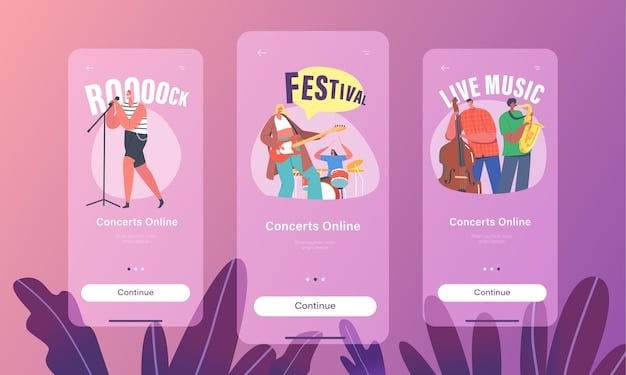Decoding K-Pop Music Shows: Ranking Systems & Fan Voting

K-Pop music shows are a central part of the industry, where artists compete for the top spot using a complex ranking system that combines album sales, streaming numbers, social media votes, and live voting, heavily influenced by dedicated fan voting strategies.
K-Pop’s vibrant music show culture is more than just performances; it’s a battleground where artists compete for weekly honors. Understanding the
The Importance of Music Shows in K-Pop
Music shows play an integral role in the K-Pop ecosystem. Beyond showcasing new releases, these programs serve as critical platforms for artists to build recognition and connect with fans. The weekly rankings and awards significantly boost an artist’s visibility and career trajectory.
What’s at Stake?
Winning a music show can lead to increased media coverage, social media buzz, and most importantly, recognition from the general public. For rookie groups, a win can be a breakthrough moment, propelling them into the spotlight.
Why Fans Care So Much
For fans, voting and supporting their favorite groups is a way of demonstrating their dedication and contributing to their success. It’s a collective effort that strengthens the bond between artists and their fanbase.
- Increased artist visibility and public recognition.
- Boost in media coverage and social media engagement.
- Breakthrough moment for rookie groups, accelerating their career.
- Strengthened artist-fan relationships through collective voting efforts.
Ultimately, the stakes are high for both artists and fans, making music shows a crucial arena for competition and community engagement in the K-Pop world.

Decoding the Ranking Systems
Each music show has its own formula for determining the winner, typically blending digital sales, physical album sales, broadcast points, social media scores, viewer voting, and expert judging. Understanding these criteria is essential for fans looking to support their favorite artists effectively.
Digital Sales and Streaming
Digital performance is assessed through downloads and streams on major music platforms. The more popular a song is digitally, the better its chances of scoring well in this category.
Physical Album Sales
The number of physical albums sold within a specific timeframe also contributes substantially to the overall score, reflecting the dedication and financial investment of the fanbase.
Broadcast Points
Broadcast points are earned through the frequency and duration of the artist’s music video being aired on the broadcasting network. More airtime means more points in this category.
Live Voting
During the live broadcast, fans can cast votes for their favorite artists, directly influencing the outcome of the show. This segment is often highly competitive and crucial for securing a win.
In summary, music shows use a blend of different criteria to determine winners, ensuring a holistic assessment that takes into account both popularity and fan engagement.
Fan Voting Strategies: A Coordinated Effort
Fan voting is not a casual activity; it’s a highly organized and strategic effort. Fanbases mobilize through online communities, social media, and dedicated voting guides to maximize their impact on the show results.
Organized Voting Teams
Dedicated teams focus on different aspects of voting, such as mass streaming, buying albums in bulk, and live voting during the show. These teams work in coordination to ensure efficiency.
Streaming Farms
Some fans establish streaming farms, where they use multiple devices to continuously stream an artist’s songs, aiming to increase their digital scores and improve their ranking.

- Setting up multiple accounts on streaming platforms to increase plays.
- Creating and sharing detailed voting guides with instructions and tips.
- Organizing group album purchases to boost physical sales numbers.
- Coordinating live voting efforts during the broadcast via dedicated apps.
By leveraging these strategies, fanbases aim to maximize their voting power and help their idols achieve success in music shows.
The Impact of Social Media
Social media plays a pivotal role in music show rankings. The number of mentions, hashtags, and video views can significantly boost an artist’s score. Here’s how social media activity impacts show results and how fans can optimize their strategies.
Trending Topics and Hashtag Campaigns
Fans launch coordinated campaigns to promote relevant hashtags and trending topics, increasing the artist’s visibility and boosting their social media scores.
YouTube Views and Engagement
The number of views, likes, and comments on official music videos on YouTube also contribute to the ranking. Fans strategize to maximize these metrics.
Influencer Outreach
Engaging influencers and content creators to promote the artist’s music and videos can significantly expand their reach and impact on social media.
In conclusion, social media is a powerful tool that fans use to amplify their support and influence music show rankings, making it an indispensable component of any successful strategy.
Controversies and Criticisms
Despite their popularity, music show ranking systems are not without controversy. Issues such as biased judging, unfair scoring, and intense pressure on fans have led to criticism and calls for reform.
Allegations of Bias and Favoritism
Some critics argue that certain broadcasting networks favor artists from their own companies, creating an uneven playing field.
Fan Exhaustion and Mental Health Concerns
The intense pressure to vote and stream can lead to fan burnout and mental health issues, raising concerns about the emotional toll of these activities.
Debates Over Fair Scoring
There are ongoing debates about the fairness of the scoring criteria, with some arguing that certain factors are weighted too heavily or do not accurately reflect an artist’s popularity.
In summary, while music shows are a cornerstone of K-Pop culture, they also face ongoing scrutiny regarding fairness, transparency, and the impact on fan well-being.
The Globalization of K-Pop Music Shows
With the rise of K-Pop’s global popularity, music shows are evolving to embrace international fans. Live streaming, global voting platforms, and multilingual support are becoming increasingly common.
Live Streaming and Global Accessibility
Many music shows now offer live streaming options with subtitles in multiple languages, allowing international fans to participate in real-time.
Global Voting Platforms
Dedicated voting apps are being developed to cater to international fans, providing a more accessible way for them to cast their votes and support their favorite artists.
Multilingual Support and Communication
Broadcasters are enhancing their multilingual support, providing resources and communication in multiple languages to engage with global fans more effectively.
As K-Pop continues to expand globally, music shows are adapting to accommodate and engage with an increasingly diverse and international fanbase.
Future Trends and Innovations
As technology evolves, future music show ranking systems may incorporate elements such as AI-driven analytics, blockchain-based voting, and personalized viewer experiences.
AI-Driven Analytics for Fair Scoring
Artificial intelligence could be used to analyze data more comprehensively and ensure fair scoring, minimizing bias and inaccuracies.
Blockchain-Based Voting for Transparency
Blockchain technology could provide a transparent and secure voting system, enhancing the integrity of the ranking process and reducing the risk of manipulation.
- AI-driven algorithms for impartial data analysis.
- Secure blockchain voting systems guaranteeing transparency.
- VR/AR stage experiences for immersive viewing from home.
By embracing these innovations, music shows can continue to evolve and remain relevant in the rapidly changing landscape of the K-Pop industry.
| Key Aspect | Brief Description |
|---|---|
| 🏆 Ranking Systems | Blend of digital/physical sales, broadcast points, and fan voting. |
| 🗳️ Fan Voting | Organized efforts using streaming, bulk album buys, and tactics. |
| 📱 Social Media | Trending topics, YouTube views enhance artist visibility. |
| 🌐 Globalization | Live streams and multilingual options boost global participation. |
Frequently Asked Questions
▼
Major criteria include digital sales, physical album sales, broadcast points, real-time voting, and social media metrics. Different shows weight these criteria differently, impacting outcome.
▼
Fans form groups dedicated to streaming, album buying, and live voting. They share streaming farm instructions and pool resources to maximize their impact together.
▼
Social media drives visibility. Fans launch hashtag campaigns and boost YouTube views, positively impacting show scores. Influencer outreach also extends their reach, globally.
▼
Biases, intense pressure on fans, and scoring controversies fuel criticisms. Some suggest broadcasting favors groups from their parent companies over others.
▼
Shows are improving global support with live streaming and multilingual options, making voting more accessible. They use global voting platforms to cater to diverse audiences too.
Conclusion
The K-Pop music show culture is a fascinating intersection of artistry, competition, and fan dedication. While the ranking systems and voting strategies may seem complex, they are integral to the industry’s dynamics and the ongoing evolution of K-Pop’s global presence.





